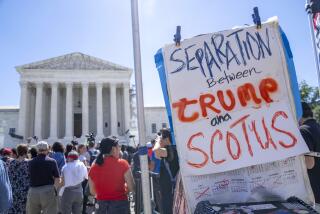Justices OK Rights Suits Against Officials of States
WASHINGTON — The Supreme Court ruled Tuesday that elected state officials may be personally sued for damages if they violate the rights of their employees or others.
The unanimous ruling strips officials of a legal immunity and means that they could be forced to pay huge damage judgments out of their own pockets.
In recent years, the more conservative Supreme Court had made it more difficult for citizens to sue the government. Two years ago, the court ruled 5 to 4 in a Michigan case that states and their officials may not be sued in their official capacities for civil rights violations.
But, on Tuesday, the justices said that these same officials may be held personally liable if they use their authority to violate the rights of another.
“This is not a groundbreaking decision,” said Richard Ruda, counsel for the State and Local Legal Center in Washington, “but it clears up a difficult, confused area of law.”
The ruling interprets a broad post-Civil War law that allows damage suits against “every person who, under color of any statute, ordinance, regulation (or) custom . . . of any state” deprives anyone of “any rights, privileges or immunities secured by the Constitution and the laws.”
During the 1960s, the Supreme Court revived this dormant, century-old law and gave citizens the power to sue government officials who had violated their rights. For example, this law provides the basis for damage suits against officers or city agencies by victims of police brutality.
But the 11th Amendment has also been interpreted to mean that states are immune to damage suits in federal courts. Because a suit against a state official in his official capacity actually is a suit against the state, the court in the Michigan decision blocked such lawsuits.
But state officials sued as individuals may not claim that they are immune, the court said Tuesday.
“We hold that state officials, sued in their individual capacity, are ‘persons’ within the meaning” of the old civil rights law, Justice Sandra Day O’Connor said for the court. She declared that the 11th Amendment does not bar such suits and that state officers have no absolute immunity from personal liability solely because of the “official” nature of their acts.
A spokesman for the California attorney general’s office said that the state generally does not pay the costs of damage awards against officials who are convicted of violating constitutional rights. During a trial, officials can defend themselves by claiming that they acted in good faith in carrying out the duties of their office.
Tuesday’s ruling clears the way for trial in a lawsuit against Pennsylvania state Auditor General Barbara Hafer. When running for the office as a Republican in 1988, Hafer was told by a U.S. attorney that 21 of the agency’s employees had “bought” their jobs through political payoffs. She publicly promised to fire the employees if she were elected.
She kept her promise, but James Melo and several other dismissed workers sued her in federal court, claiming that they were fired solely because they are Democrats. They said that an arbitrator can clear them of charges that they obtained their jobs improperly.
A federal judge initially dismissed the suit against Hafer on the grounds that she was immune, but an appeals court in Philadelphia revived it. The 8-0 ruling affirms the appeals court decision.
More to Read
Get the L.A. Times Politics newsletter
Deeply reported insights into legislation, politics and policy from Sacramento, Washington and beyond. In your inbox three times per week.
You may occasionally receive promotional content from the Los Angeles Times.











